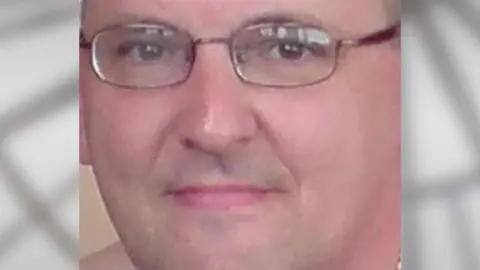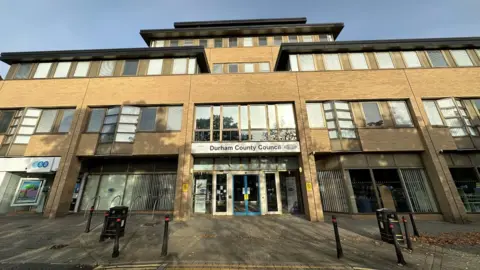'Low-risk' Willington man killed himself days after previous attempt
 BBC
BBCMental health staff were unaware a man had made several phone calls about suicidal thoughts when they treated him as low-risk, an inquest has heard.
David Stevens, 57, died at his home in Willington, County Durham, on 15 June 2022.
Two days previously he had been treated in hospital for an overdose.
The inquest will be looking at "failings" involving Tees, Esk and Wear Valley NHS Foundation Trust workers, the coroner Janine Richards said.
The inquest in Crook heard Mr Stevens, who was a taxi driver, had complex issues involving anxiety, negative thoughts and hearing voices.
On 13 June he was treated at University Hospital of North Durham after taking an overdose of antidepressants.
He was discharged on later that day and returned to his home in Norwich Gardens, where neighbours saw him close his curtains.
- You can find information and support on the BBC's Action Line

On 15 June, concerned neighbours contacted the police, who forced entry and found his body.
A pathologist concluded that he had died as a result of hanging, the inquest heard.
He was being treated by the mental health trust's access team, which deals with those considered at low-risk of self harm and suicide.
But the access team was unaware he had made multiple calls to the police, Samaritans and the crisis team at their own trust, in which he had mentioned suicidal thoughts, the coroner heard
In January 2022 he had been referred to the access team by Talking Changes, a therapy service he had contacted but which had found his needs were too complex for it.
'Lonely'
He was screened over the phone by a nurse on 3 February and then had a more in-depth assessment on 26 April, which concluded he had dysthymia, a personality traits disorder, "heightened anxiety" and heard voices.
Kay Markwell, the access team clinician, said she had met him properly for the first time on 23 May in Bishop Auckland and found him "very pleasant" and "engaging".
She said he reported feeling "lonely" and that a lack of sleep had been a "huge issue". But he was taking a new antidepressant to help with that and was "feeling an awful lot better".
She said he was looking forward to more sessions and gave no indication that he needed further help.
She added he was "bright" and "chirpy", had stopped using social media, which had been a major cause of his anxieties and was only watching "happy TV". She said he was avoiding the news - as that would affect his mood - and had a good bed-time routine.
"At no point did I have any concerns about David," Ms Markwell said. She added that, had this been the case, she would have escalated his case to the crisis team, which deals with those considered "high-risk".
'Remorseful'
Under questioning from the coroner, Ms Markwell admitted she did not know the "bigger picture" concerning all the calls he had been making to other services.
However, she said she had known about his 13 June overdose after being contacted by a psychiatric liaison nurse at the hospital.
Ms Markwell said Mr Stevens had told her that he was "remorseful" about the suicide attempt and "very clearly regretted his actions".
She added it had been his choice to keep his treatment as it was and his next appointment had been scheduled with her for 21 June.
'Overwhelming worry'
The inquest heard Mr Stevens called the crisis team 15 times between 12 May and 1 June, as well as ringing the police and Samaritans on several occasions.
He had expressed concerns about his medication and was advised to speak to his GP.
On 29 May he said he was having thoughts of suicide, did not want to die but was "struggling with overwhelming worry".
His last contact, a 15-minute call made at about 08:15 on 1 June, was answered by Sharon Banbrough.
She told the inquest he had said he was extremely anxious over a "social situation", which was the root of much of his worry as well as his contact with police. He had asked the police if they could "control" what was put on social media.
Ms Banbrough said he was "ruminating" and "catastrophising" but that he had responded really well to talking therapy. She said by the end of the call he had been apologetic for even ringing up.
She said he did not "warrant" a further crisis assessment and had not mentioned suicidal thoughts.
The inquest heard the Bishop Auckland-based crisis team was in "special measures" at the time, and while there should have been four qualified clinicians and two support workers on shift, there were "very often" only two or three clinicians.
Ms Banbrough said the volume of work was "at times" unmanageable, adding that it "didn't bear thinking about".
'Dead by next week'
Ellen Clark, a psychiatric clinician at the hospital, said she spoke to Mr Stevens on the ward after his overdose attempt.
She said he was "quite scared about what could have happened", adding he did not want to die and was "very regretful" about the suicide attempt.
Ms Clark said he was "keen" to return to his treatment with the access team and "appeared to show a lot of insight" that his anxieties were "around situations that arose in his personal life", adding he was "very fed up" and "sleep deprived".
She said she followed standard practice after an overdose by recommending he only be given seven days-worth of his medication to "mitigate" risks of a second attempt, but that was miscommunicated to Mr Stevens by other hospital staff and he became "very frustrated" and made threats to sue.
He also made a comment that he would be "dead by next week" but when pressed on what he meant denied he had any suicidal intentions, Ms Clark said.
'Missed opportunities'
Lily Lewis, representing Mr Stevens' family, said a review had been carried out identifying several issues with his care, including a failure to give him any "new skills or treatments to manage his anxiety".
Ms Richards said the scope of the inquest would be to look at his mental health diagnosis and treatment, and whether there were "any failings or missed opportunities" relating to his death.
The inquest - which is due to last three days - continues.

Follow BBC North East & Cumbria on X (formerly Twitter), Facebook and Instagram. Send your story ideas to [email protected].
